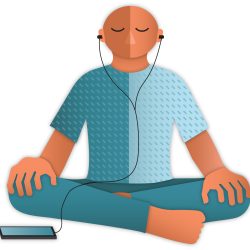Balancing Athletic Excellence and Mental Health
Sports psychiatrist Claudia Reardon ’01, MD’06 helps Badger stars overcome depression, anxiety, and eating disorders.

Reardon: “I wonder how there could possibly be any high-level athlete who doesn’t have some degree of suffering.”
In August, a seemingly flawless athlete turned fallible on sport’s biggest stage. When superstar gymnast Simone Biles withdrew from Olympic competition citing mental health concerns, some viewers saw failure. Claudia Reardon ’01, MD’06 saw progress.
“When a high-level athlete speaks up on mental health symptoms, I see the difference the next day in my clinical practice,” Reardon says. “More athletes come in for treatment, and they feel less embarrassed and ashamed.”
In her practice, the patients are UW student-athletes. Reardon, a professor of psychiatry at the School of Medicine and Public Health, is the consulting sports psychiatrist for UW athletics. To help student-athletes overcome depression, anxiety, eating disorders, and other mental health conditions, she must treat both the student and the athlete. Doing so requires a delicate balance, weighing both the patient’s well-being and performance capacity.
“I always say, ‘I get that one one-hundredth of a second matters. And if I slow your 100-meter dash time down by that much, it’s a big deal,’ ” Reardon says. “A nonathlete may not care, but an athlete will say, ‘No, I will not take a med that will slow me down. I worked hard for that one one-hundredth of a second.’ ”
Reardon’s caseload encompasses the entire student-athlete population. “It’s growing every year,” she says, noting that college athletes face a unique set of pressures on the playing field, in the classroom, and back home.
Reardon is also a familiar face on the world stage. The International Olympic Committee (IOC) asked her to cochair the Workgroup on Mental Health in Elite Athletes. The committee reviewed almost every piece of existing literature on mental health issues in athletes and published a 2019 consensus statement in the British Journal of Sports Medicine. It concluded: “Mental health cannot be separated from physical health, as evidenced by mental health symptoms and disorders increasing the risk of physical injury and delaying subsequent recovery.”
“If you’re stressed and anxious, you’re more likely to hold your muscles tensely and to be distractible,” Reardon says of the heightened injury risk. “Ultimately, we want mental health care to be just as accessible as other aspects of medical care for athletes. We want them to be screened for mental health disorders just as they’re screened for cardiac disease.”
Reardon continues to work with the IOC and coleads its diploma program on mental health in elite sport, a nine-month course for physicians and mental health professionals. The work is personally fulfilling. Her brother, sprinter Andrew Rock, won a gold medal for Team USA in the 2004 Olympics and inspired her to treat the athlete population.
Sports psychiatry is a surprisingly new field. In 2016, Reardon published a paper on the medication preferences of psychiatrists who work with athletes. Only one other academic article had ever addressed the topic. She attributes the late start, particularly compared to sports psychology, to stigma.
“People may think of psychological performance-enhancement strategies: how can I improve my sports performance?” she says. “And we know when athletes are asked, they feel much less embarrassed to reach out for those kinds of services, as opposed to reaching out for help with actual mental health symptoms, diagnoses, and treatment.”
Treating athletes presents other unique challenges. Some effective medications — such as the stimulant Adderall to treat ADHD — can be banned by sports bodies as performance-enhancing. Others are potentially dangerous for athletes who are pushing their bodies to the extreme. Accurate diagnosis can also be more difficult because of symptom overlap: is an athlete feeling “off” because of overtraining or because of underlying depression?
Occasionally, mental health problems surface during competition. Biles described her difficulties on the vault as a case of the twisties — a gymnast’s inability to get control in the air. A similar phenomenon is known as the yips in other sports, where athletes may suddenly forget how to accurately throw a baseball or swing a golf club.
“We don’t have a full understanding of this concept,” Reardon says. “It’s believed to exist on a continuum — where on the one extreme, it’s purely anxiety-fueled, and on the other extreme, it’s purely a neurologic condition where your muscles just don’t work right.”
With Biles and other elite athletes speaking openly, Reardon feels we’re in a golden age of mental health in sports. She believes defeating the mental health stigma in this arena can translate to wider society. Such progress will require the public to treat elite athletes not as invincible superheroes, but as vulnerable people. Every day, Reardon sees their all-too-human side: the intense pressures they face; the lack of empathy they receive; and the perfectionistic personality traits that can lead them to both greatness and darkness, as when meticulously tracked nutrition devolves into a severe eating disorder.
“The public perception can be, ‘How is that compatible with what we see on the outside, which is this strong, amazing athlete?’ ” Reardon says. “And my reaction is always, ‘I wonder how there could possibly be any high-level athlete who doesn’t have some degree of suffering.’ ”
During nearly every intake appointment with a UW student-athlete, Reardon is reminded of the most rewarding part of her work.
“It’s the look of relief on their faces when they feel heard and understood,” she says, “when they feel as if they are not abnormal.”
Published in the Winter 2021 issue



Comments
No comments posted yet.